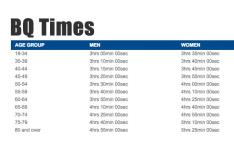Avoiding the Injury Cycle
When runners neglect this advice, they often find themselves in a viscous injury cycle that is tough to break out of. Here's how that cycle typically works:
- First, the sharp initial increase in training results in a small injury that sets you back a week. Remember, your aerobic system develops at a faster rate than your muscles, tendons, ligaments and bones. So, while you're not winded running, your muscles are still struggling to adapt.
- To make up for missed time, you begin to push the envelope with your mileage and long runs in order to get back on track. Unfortunately, this typically leads to developing another small injury.
- The cycle repeats itself throughout the entire training segment until race week, when you realize you haven't put together a solid month of training since you started your training plan.
In the end, this dreaded cycle not only ruins your chance at having a great race experience, but it is also a detriment to your long-term development. Instead of spending the previous 3 to 4 months slowly and safely building your mileage and aerobic system, you spend three months mostly injured and your body is no further along in its adaptation to training.
More: How to Find Your Weaknesses as a Runner and Avoid Injury
How Should You Approach Your Training?
The best approach to preparing yourself to run a marathon as a beginner is to do what coaches call "taking the next logical step in your development."
This training concept centers around putting your race distance and time goals on the back burner and simply focusing on taking the next logical step in your fitness and training each week. Specifically, the goal is to increase your volume only as much as your body is ready to handle and train to your current fitness level, not where you want to be for a specific race date.
More: Improve Your Run Training: How to Peak at the Right Time
Therefore, instead of rushing your training to be ready for a specific date, you're able to listen to your body and take the small steps needed to increase your mileage and paces without getting injured. When you've reached a training level that allows you to run the necessary long runs, mileage and workouts for a good marathon, you can set the date and start your marathon training.
With the extreme popularity and accessibility of marathons these days, it can be hard to forgo the temptation to race one, even if you might not be ready. However, if you're a new runner you should look closely at your training and goals to determine if running a marathon is the right choice for your long-term and short-term development.
Perhaps the better choice is to train to your current fitness, always take the next logical step in your development, and keep your focus on the process. You'll train more consistently, stay healthy, and make progress week after week, month after month. Then you'll be ready to have a great marathon experience.
More: How to Deal With Marathon Race-Day Problems
 Sign up for your next race.
Sign up for your next race.- 2
- of
- 2
About the Author
Get ACTIVE on the Go


Couch to 5K®
The best way to get new runners off the couch and across the finish line of their first 5K.
Available for iOS | Android







Discuss This Article